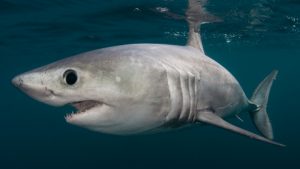 As part of the Academic Targeted Research Scheme, I started my new role as Senior Lecturer in Sustainability, Impact and Consumption on the 1st of July this year.
As part of the Academic Targeted Research Scheme, I started my new role as Senior Lecturer in Sustainability, Impact and Consumption on the 1st of July this year.
 My research will focus on predator ecology and conservation and the project funded by the scheme is specifically centred on the porbeagle shark (Lamna nasus). The UK has several species of shark that call our waters home for at least part of the year and many are in dire need of conservation management. Highly mobile, migratory top predators like the porbeagle are important to understand and manage as they play vital roles in nutrient cycling, ecosystem linkage and maintaining food web stability as well as just being incredible species in their own right. Such species are also pretty difficult to study, especially in the marine environment!
My research will focus on predator ecology and conservation and the project funded by the scheme is specifically centred on the porbeagle shark (Lamna nasus). The UK has several species of shark that call our waters home for at least part of the year and many are in dire need of conservation management. Highly mobile, migratory top predators like the porbeagle are important to understand and manage as they play vital roles in nutrient cycling, ecosystem linkage and maintaining food web stability as well as just being incredible species in their own right. Such species are also pretty difficult to study, especially in the marine environment!
Porbeagles are included on IUCN Red List of Threatened Species as critically endangered in Europe and the Northeast Atlantic, largely due to overfishing in commercial fisheries. They are closely related to great white sharks (Carcharodon carcharias) and share their more mammalian-like features of being warm-bodied and giving birth to live young, though they ‘only’ grow up to roughly 3.5 meters as opposed to the 6-meter white shark. Dorset is emerging as a hotspot for these elusive animals, which migrate to our shores in the summer months. They are proving to be a popular target in the catch and release recreational fishery, which provides a valuable opportunity to learn more about them.
Under Home Office licence, I’ll be joining recreational fishing trips and collecting small muscle biopsies from porbeagles and other sharks for stable isotope and fatty acid analyses. These analyses will provide insights into the relatively long and short-term diet and habitat use of the sharks, telling us more about their trophic ecology and movement patterns and providing information on how to best manage and protect them.
In addition to joining the angling trips, in collaboration with colleagues from the University of York, I’ll be conducting a survey of recreational shark anglers to gain insight into their perceptions of and attitudes towards UK shark populations and their conservation. In partnership with other external experts, I will also be running best-practice shark handling workshops with the aim of building capacity in the angling community and improving the sustainability of the fishery by maximising the health of released fish.
I am aiming to develop a suite of complementary projects alongside my work on the UK shark recreational fishery and am delighted to have already won some funding for a project on kestrel (Falco tinnunculus) trophic ecology, using stable isotope analysis of feathers to update our understanding of their contemporary diet. Furthermore, I am developing projects on small mustelids and big cats and am very excited to work on such a diverse group of species, conducting high quality research that will result in tangible conservation benefits for biodiversity and society. I am very open to interdisciplinary collaboration and would welcome anyone with ideas to get in touch!
 Focus on Fellowships – Academic Targeted Research Scheme
Focus on Fellowships – Academic Targeted Research Scheme Academic Targeted Research Scheme (Sport & Sustainability): Women in Sports Leadership
Academic Targeted Research Scheme (Sport & Sustainability): Women in Sports Leadership










 Missing Persons Indicator Project Recruitment
Missing Persons Indicator Project Recruitment Celebrating our Research: Postgraduate Research Showcase 2026
Celebrating our Research: Postgraduate Research Showcase 2026 Nursing Research REF Impact in Nepal
Nursing Research REF Impact in Nepal Fourth INRC Symposium: From Clinical Applications to Neuro-Inspired Computation
Fourth INRC Symposium: From Clinical Applications to Neuro-Inspired Computation ESRC Festival of Social Science 2025 – Reflecting back and looking ahead to 2026
ESRC Festival of Social Science 2025 – Reflecting back and looking ahead to 2026 3C Event: Research Culture, Community & Cookies – Tuesday 13 January 10-11am
3C Event: Research Culture, Community & Cookies – Tuesday 13 January 10-11am ECR Funding Open Call: Research Culture & Community Grant – Application Deadline Friday 12 December
ECR Funding Open Call: Research Culture & Community Grant – Application Deadline Friday 12 December MSCA Postdoctoral Fellowships 2025 Call
MSCA Postdoctoral Fellowships 2025 Call ERC Advanced Grant 2025 Webinar
ERC Advanced Grant 2025 Webinar Horizon Europe Work Programme 2025 Published
Horizon Europe Work Programme 2025 Published Update on UKRO services
Update on UKRO services European research project exploring use of ‘virtual twins’ to better manage metabolic associated fatty liver disease
European research project exploring use of ‘virtual twins’ to better manage metabolic associated fatty liver disease